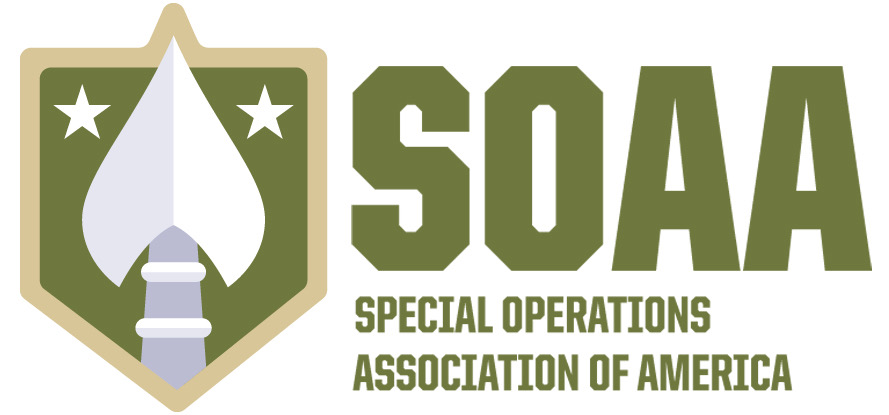The Military Special Operations Family Collaborative (MSOF) is partnering with the Special Operations Association of America (SOAA) to collaborate in our efforts to address comprehensive health needs, provide relief and care to Operators, Veterans and their families, and motivate top-down change from Capitol Hill in how we as a Nation care for and support our Special Operations Forces.
In 2020, the U.S. Special Operations Command (USSOCOM) conducted an organization-wide review and responded to findings with renewed attention to developing the force’s competence and character. The health and care of Special Operations Forces (SOF) is a key pillar to these efforts. After nearly 20 years of continuous deployment to war and training, it is clear the 70,000 Army, Navy, Marine Corps, and Air Force special operations Servicemembers, their families, and the estimated 40,000 SOF Veterans need a healthcare model designed specifically to anticipate the sustained demands that hew force performance and wellness.
Service in special operations affects Servicemember health and performance, family well-being, and life after military service in unique ways. Leaders have struggled to reconcile a traditional approach to military health and readiness with strains on the force, even creating USSOCOM’s Preservation of the Force and Family, a comprehensive human performance and wellness program. They regularly confront bureaucratic barriers and a health system that does not fit a special operations’ career paradigm.
Some will criticize special operations for seeking entitlement; but health is a basic enabler of military skills. The role of SOF is to conduct special missions in defense of the Nation to include unconventional warfare, high-stakes strikes, hostage rescue, and other unique military missions. Each mission requires a high-level of specialty training and skill. SOF training and operations expose operators to a career of chronic stress and often a high blast dosage not commonly shared with other elements of the U.S. military.
Most operators have previous conventional experience; and as a result, they tend to be slightly older. They are already worn when they begin their military special operations career and commit to a grueling pace of training and operations. Operators can expect to spend 9 months or more of each calendar year deployed or away from home training. They sustain this pace for 12-20+ years, often racking-up 8-20 deployments. According to the Special Forces Charitable Trust, a Green Beret soldier with a 15-year-old child has only been home for about 5 years of their child’s life. Estimates of force divorce rates easily exceed 80 percent.
SOF duties include sustained occupational hazards, use of demolitions, physical wear and tear, injuries, and dysregulated sleep. Those seeking post-service care often report more than 10 orthopedic surgeries, 2,000-3,000 airborne jumps, toxic exposures, and career blast wave exposures several orders of magnitude higher than conventional counterparts. These hazards have a lasting and cumulative impact on body and brain, and they influence how special operators understand and access care.
These stressors differ in such a degree to other Servicemembers that medical professionals identified a unique syndrome currently termed operator syndrome. This refers to the sum total of unique medical, psychological, and social healthcare needs that include traumatic brain injury, endocrine (hormonal) dysfunctions, sleep apnea, sleep disturbance, chronic pain and headaches, marital and sexual dysfunction, cognitive impairments, vestibular problems, and existential challenges, as well as substance abuse, psychiatric disorders. Some attribute special operations’ higher risk of suicide to these difficulties.
Current care models for post-traumatic stress and traumatic brain injury employed by the Defense Health Agency and Veterans Affairs address the parts, but not the whole. They fail to hit the mark because their healthcare realities demand a comprehensive and multidisciplinary approach to SOF active and V
Veteran health and care, with special attention paid to performance and military transition-related issues and policy.
The Military Special Operations Family Collaborative and Special Operations Association of America recommend unique research be conducted and an update to current health and care practices within the Departments of Defense and Veterans Affairs for SOF and their families. Starting with the Defense Health Agency, the medical community ought to acknowledge special operations as a unique military health population. It is necessary to invest in innovative, longitudinal research for force and family and provide culturally competent and well-coordinated care. No studies have been funded to understand the challenges and needs of special operations families, and the family plays a critical role in sustaining SOF performance and well-being. In a 2018 MSOF survey, only 13% of SOF families believed resources met their family needs and a mere 18% felt capable of pursuing their own goals. This glaring lack of resources is not so surprising when you learn special operators delay care for all non-catastrophic injuries an average of 13 years and 3 months.
Congress primarily funds health, care, and family resources through the service branches, and this hinders adaptations necessary for special operations units. This problem is especially prominent in the years surrounding transition from active duty status. Military leaders ought to be equipped to make decisions grounded in evidence that reflects and projects the long-term health and readiness of their force.
We marginalize readiness and fail our warriors and their families when we refuse to account for the toll of their career until their final moment of service. The special operations Servicemembers, Veterans, and their families need and deserve a new model of health and care. This is imperative for force readiness and national security.
KaLea Lehman is the Executive Director and Founder of the Military Special Operations Family Collaborative, a nonprofit public health initiative for the special operations community. B. Christopher Frueh is professor of psychology at the University of Hawaii, Hilo and the lead author of “Operator Syndrome”: A unique constellation of medical and behavioral healthcare needs of military special operations forces. The International Journal of Psychiatry in Medicine 2020; 55:281-295.





